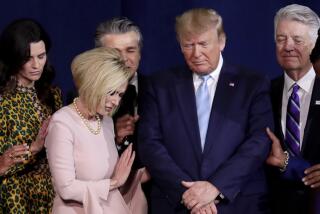Column: Clinton and Trump will be held to different debate standards, but that’s OK
A few weeks ago, Republican pollster Frank Luntz asked a group of undecided voters what they thought of Donald Trump and Hillary Clinton. They didn’t much like either one.
Trump’s “crazy,” they chorused — “a charlatan.” Clinton is “deceitful,” “dishonest,” they said.
“So what can Trump do to win your vote?” Luntz asked. “Be more presidential,” one man said, drawing nods.
What can Clinton do? “Be honest,” several said.
But when Luntz asked how Clinton could show that she’s trustworthy, the voters shook their heads. They were stumped.
That’s a central problem in Monday’s debate: The candidates face different challenges — so they have different objectives. And that will make it impossible to judge them by one simple standard; some kind of “double standard” is inevitable.
Trump needs to show skeptical voters that he’s competent... Clinton [will have to focus] on how she would make voters’ lives better.
Trump needs to show skeptical voters that he’s competent – that he can actually handle the job of president of the United States. Clinton must avoid unwinnable arguments about her honesty, and focus instead on how she would make voters’ lives better.
The Republican’s goals appear considerably easier.
If he can look and sound “presidential” for 90 minutes, he can gain some ground among voters who like that he’s a different sort of candidate — to say the least — yet fear his bull-in-a-china-shop temperament.
Trump offered a glimpse of his probable strategy in an interview with Bill O’Reilly on Fox News last week: He plans to say the word “change” a lot, and argue that Clinton represents continuity instead.
“She has been there a long time. And we need change in this country,” he said. “When I hear her talking about what she is planning to do, why hasn’t she done it for the last 30 years?”
If Trump keeps his criticism of Clinton on that high plane, he could win. But if he yields to his penchant for belittling opponents, he could lose — especially if he slams Clinton in a way that sounds sexist. (One of his low points in the GOP primary debates came after he derided Carly Fiorina’s looks; Fiorina cut him off at the knees.)
The bigger test for Trump could come from the usually simple challenge of explaining the details of his own policies. Often, there aren’t any. In interviews during the campaign, he has struggled to explain how many of his ideas would actually work.
“It’s not just modulating the way he talks,” Republican pollster David Winston told me last week. “He’s got to come across in a way where people might say, maybe he can really do this.”
Clinton must do more, much more.
In a single evening of debate, she can’t prove that she’s more honest than her critics say — and she knows that. Her aides have long acknowledged that the “honesty” question can’t simply be argued away.
Instead, she needs to persuade voters that she deserves their trust in a different way: by convincing them that she will get things done.
Clinton has plenty of policies and proposals, of course — enough to fill a 256-page book. (Literally. Her campaign published it this month.) Precisely because she has so many, however, it’s not always clear which ones are most important, and which she’ll try hardest to implement. (The voters in Luntz’s focus group, which was sponsored by AARP, struggled to describe what her campaign priorities were.)
She’s a complexifier, not a simplifier.
“When I read about these giant debate books they’re preparing for her, I cringe,” Samuel Popkin of UC San Diego, who coached several earlier Democratic candidates before their debates, told NPR this week. “Her biggest challenge is going to be telegraphing clean, simple statements to the audience, instead of litigating and beating Donald Trump on facts and details.”
There’s been a flurry of discussion over whether the debate will be judged fairly, especially by the media. That argument has mostly ignored the fact that there isn’t a simple point system or a single list of criteria for deciding who “wins” a presidential debate. (This isn’t as straightforward as figure skating, which also produces plenty of controversy.)
Yes, Trump will be graded on a curve: Is he more dignified, more truthful and less bullying than he has been for most of the campaign?
But Clinton will be graded on a curve, too — can she connect with voters in a way she hasn’t until now?
Although Clinton’s curve looks tougher, here’s one bit of solace for her supporters: She’s ahead in the polls, which means Trump needs a successful showing more than she does. If the debate is a draw, the campaign will stay about where it was — and that would be good news for Clinton.
Twitter: @DoyleMcManus
Follow the Opinion section on Twitter @latimesopinion and Facebook
More to Read
A cure for the common opinion
Get thought-provoking perspectives with our weekly newsletter.
You may occasionally receive promotional content from the Los Angeles Times.







